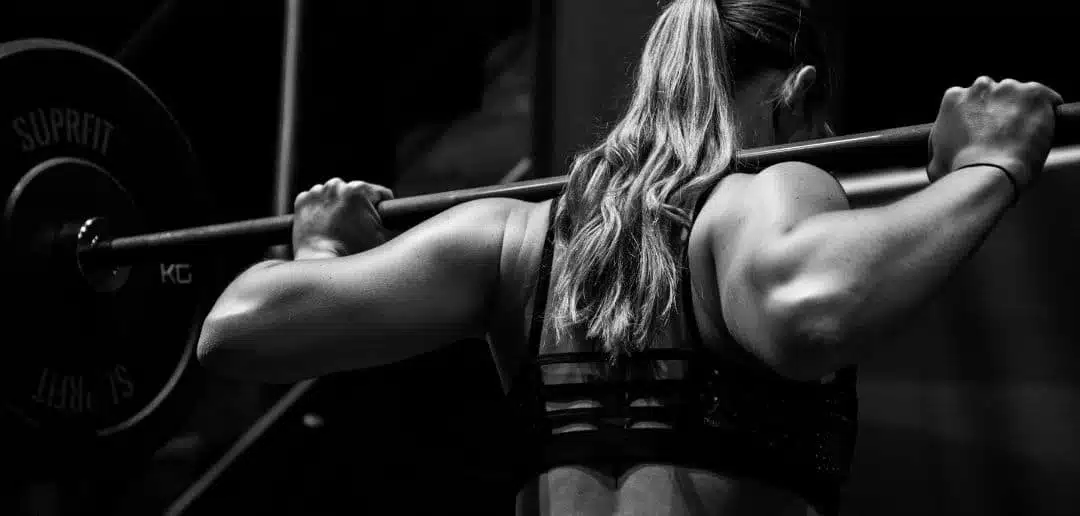31 de October de 2023
Why Am I Struggling To Lift Heavier Weights?
Strength training has become a big deal in today’s society. More and more young folks realize that lifting heavy weights is a smart strategy for getting stronger and improving their body composition. However, lifting heavy has become somewhat risky thanks to influencers. When you start at the gym, the first thing you’ve got to understand is that your ego needs to stay outside. Going with friends and trying to outdo each other in lifting the most weight will likely lead to injuries.
Lifting heavy isn’t something that happens in a matter of days or weeks. It takes time for our bodies to adapt and lift heavy weights without needing to change the technique, keeping control of the range of motion and engaging the target muscles. Even when you’ve got the technique down and know how to lift heavy, your body sometimes has a mind of its own, and imbalances can develop. Why do some people develop their right pec more? Why do some folks load up their left trapezius? These imbalances are due to the way they lift weights.
That’s why when you’re lifting heavy, it’s essential to follow a good training program and adapt exercises and techniques to each individual. In the world of Sports Science, this is called the principle of individualization, which allows for customized and specific training for each person’s conditions and needs.

In today’s post, we’re going to delve into why some folks struggle to lift heavy weights and what determines whether a person can lift heavy or not. Before we dive into the article, I need to make it clear that, to a large extent, lifting heavy relies more on a person’s determination and their ability to endure than on external factors like technique, machines, or exercises. The training mindset is crucial in this context.
Why Is It Important To Lift Heavy?
First and foremost, strength training has proven to be beneficial for people’s overall health (1). Lifting heavy is synonymous with having strong muscles and robust joints and tendons. Westcott and his team classify strength training as medicine. It has already been demonstrated that strength training, for instance, is beneficial for conditions like type II diabetes (2). As we’ve mentioned earlier, society is increasingly aware of the importance of strength training for health, and lifting heavy has also shown to have health benefits.
But we don’t just lift heavy for health; we also do it for performance and self-care. The feeling of being able to lift twice your body weight in a deadlift or 1.5 times your weight in a squat is an amazing sensation for someone looking to stay in shape. Lifting heavy is crucial because it helps your body stay in good shape as you age. There’s a saying that goes, “Time itself doesn’t make you fragile, it’s what you do during that time that matters.” If over time, you stop training, stop moving, and fail to provide your body with the necessary exercise, your body starts to deteriorate.

That’s why, whether you’re young or old, lifting weights for health, aesthetics, or performance, the important thing is to keep your body in motion and promote good joint and muscle health. And for that, lifting heavy is a great choice.
Important Factors For Lifting Heavy:
We’ve already mentioned that lifting heavy can be risky if you don’t follow some fundamental aspects. Below, we describe these aspects so that you have no problems when lifting heavy:
Proper Technique is Crucial
We’ve already emphasized that technique is paramount when lifting heavy. Poor technique can lead to musculoskeletal injuries and hinder your training progress. It’s essential to maintain good form in all exercises. Pay special attention to certain exercises like deadlifts, squats, or bench presses, as they are fundamental in powerlifting and typically involve lifting heavy weights. Incorrect technique can significantly increase the risk of injuries and reduce exercise effectiveness. When performing weightlifting exercises, it’s vital to maintain proper posture, control your breathing, and focus on the muscles you’re working. Sometimes, a small adjustment in technique can make a big difference in your ability to lift more weight.
Progression is Necessary for Lifting Heavy
The essential characteristic for lifting heavy is the principle of progressive overload. One of the main reasons why some athletes can’t lift heavy weights is that they haven’t followed a good progression. It’s crucial to follow a well-structured training program that allows you to gradually increase the weight you lift. If you attempt to lift too much weight right from the start, you’re likely to increase the risk of injury or hit a plateau quickly. A common mistake when aiming to lift heavy is starting with very heavy weights too soon, overloading your muscles, experiencing discomfort, and having to reduce the weight to adapt.
Lifting heavy can be incredibly rewarding and beneficial for your fitness, but it’s essential to prioritize safety and progression to ensure you see positive results without risking injury.

On the other hand, implementing progressive overload allows your muscles, tendons, joints, and nervous system to adapt to the increased load more naturally and gradually. This aids in improving your strength and pushing your limits with complete safety, setting aside your ego and the risk of injuries.
Varying Your Exercises When Lifting
One could say that hitting a plateau is quite challenging. In fact, when I work with my athletes, I tell them that the first thing they need to learn is that for a muscle to adapt and improve, it needs to face the same tension repeatedly. This means that we need to repeat exercises, and we can’t be changing exercises every week or every month. However, when you do hit a plateau in a specific exercise, it’s necessary to introduce a different stimulus to continue progressing. Lack of variety in your workout routine can also be a reason why you struggle to lift more weight. If you always do the same exercises with the same amount of weight, your muscles will get used to that particular stimulus, and you might not experience significant strength growth.
It’s important to regularly change your exercises, repetitions, and sets, as well as include exercises that work different muscle groups. This will continually challenge your muscles and give them new reasons to grow and strengthen. And how do you know how often to change exercises? From our perspective, it’s best to seek guidance from a professional who can help you with your training.
Make Sure You Get Enough Rest
Rest is one of the fundamental pillars in training, especially when you want to lift heavy. It’s been shown that a lack of sleep or insufficient rest has a negative impact on performance (3). Many athletes and coaches focus on the training aspect (which is crucial) but overlook other factors like rest and nutrition. In this regard, Van Helder and colleagues analyzed the effects of sleep deprivation on athletic performance, observing a decrease in performance after periods of inadequate rest (4). Furthermore, this lack of sleep often leads to increased stress levels in athletes. Prolonged stress can elevate catabolic hormone levels, which can negatively affect recovery and muscle growth (5). Additionally, a lack of adequate sleep can also impact your energy and focus during training.
Try to reduce stress in your life through stress management techniques like meditation or yoga, and make sure you get enough sleep to allow your body to recover properly.
Analyzing Your Entire Body is Essential to Lifting Heavier Weights
Although often overlooked, the initial assessment of an individual is tremendously important because it can save you a lot of effort in your training. When we conduct an initial evaluation, we can detect imbalances and poor postures that may impact your performance in the future. Sometimes, despite your best efforts, there might be physical limitations that prevent you from lifting heavier weights. These could include past injuries, muscle imbalances, or structural issues. That’s why it’s crucial to provide individualized attention to the athlete and be certain about their potential progress.
For example, if you suspect that a physical limitation is affecting your ability to lift heavier weights, it’s important to seek guidance from a fitness professional. Let’s go back to the earlier example, which could very well be my own situation. After experiencing multiple injuries in both ankles, it’s highly likely that your gait, foot alignment, and the alignment of your ankles, knees, and hips are compromised. In this case, you need to assess if your stride is correct and if your range of motion is right when performing an exercise like squats. In my case, I had a clear dorsiflexion deficit due to all the ankle injuries.
In such situations, the first thing to understand is that in the long run, this “injury” will hinder heavy lifting. That’s why I started with specific work to increase my dorsiflexion range, and today, I have no issues. To lift heavy, you need to thoroughly analyze your entire body and ensure there are no imbalances.

Conclusion
To wrap it up, let’s provide a brief summary of the entire article, highlighting the most crucial aspects of why you might be struggling to lift heavy. First and foremost, it’s essential to remember that lifting heavy is a gradual process, and to be able to lift two times your body weight or 1.5 times your weight, proper progression is a must. Failing to do so will likely result in injuries or imbalances in your body that can lead to long-term discomfort.
Secondly, it’s worth noting that for effective progression and heavy lifting, it’s best to seek the guidance of a fitness professional who can assist and guide you through the process. There’s nothing more valuable than prevention.
And finally, here are some reasons why you might not be achieving your heavy lifting goals:
- Good Technique is crucial. Review it.
- Progression is necessary for lifting
- Change exercise to lift heavy
- Rest
- Analyze your entire body to lift heavier
Remember that lifting heavy is a result of good training. Train well, rest well, analyze your exercises and your technique, and you’ll end up lifting heavy.
Unai Adrián Perez de Arrilucea Le Floc’h
- Westcott WL. Resistance training is medicine: effects of strength training on health. Current sports medicine reports. 2012;11(4):209-16.
- Wood RJ, O’Neill EC. Resistance training in type II diabetes mellitus: impact on areas of metabolic dysfunction in skeletal muscle and potential impact on bone. Journal of nutrition and metabolism. 2012;2012.
- Fullagar HH, Skorski S, Duffield R, Hammes D, Coutts AJ, Meyer T. Sleep and athletic performance: the effects of sleep loss on exercise performance, and physiological and cognitive responses to exercise. Sports medicine. 2015;45(2):161-86.
- Van Helder T, Radomski MW. Sleep deprivation and the effect on exercise performance. Sports medicine. 1989;7:235-47.
- Wray CJ, Mammen JM, Hasselgren P-O. Catabolic response to stress and potential benefits of nutrition support. Nutrition (Burbank, Los Angeles County, Calif). 2002;18(11-12):971-7.

